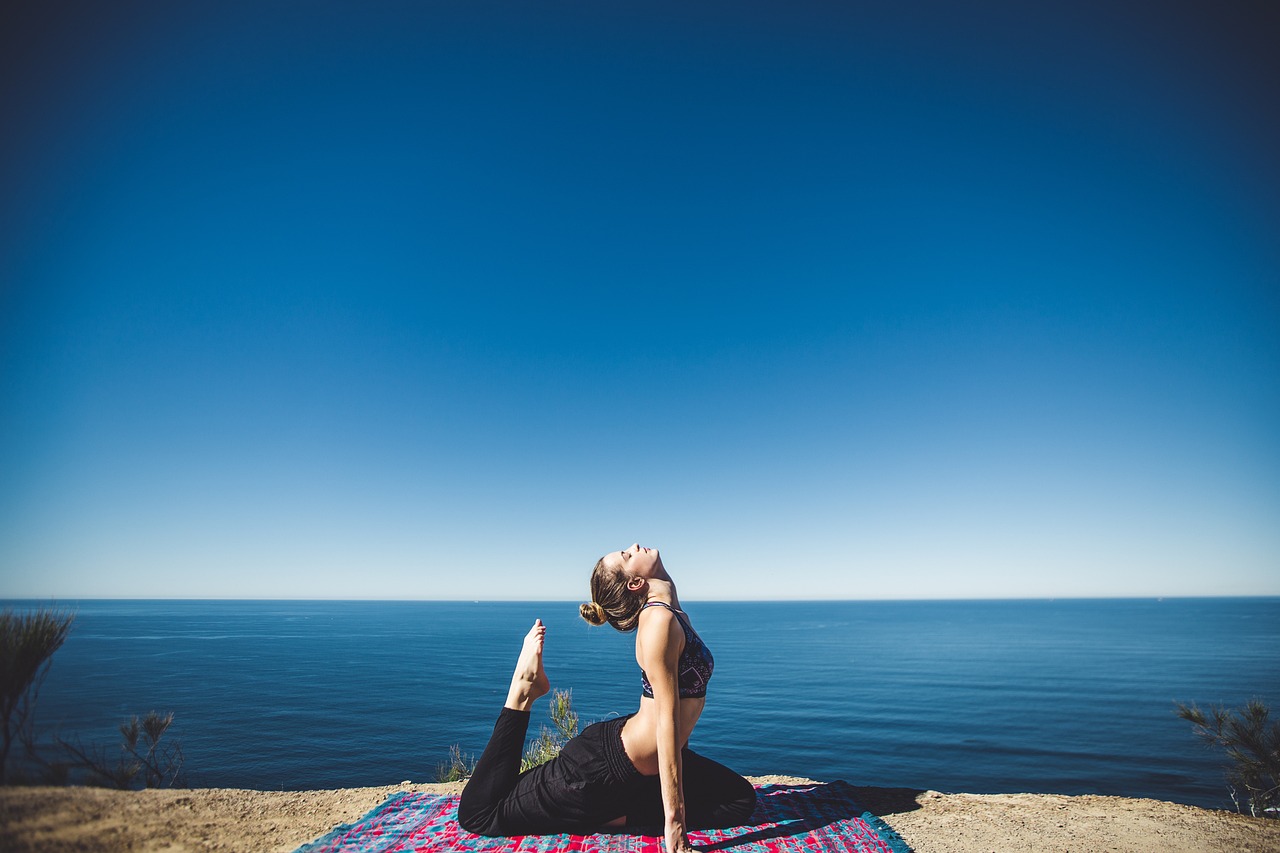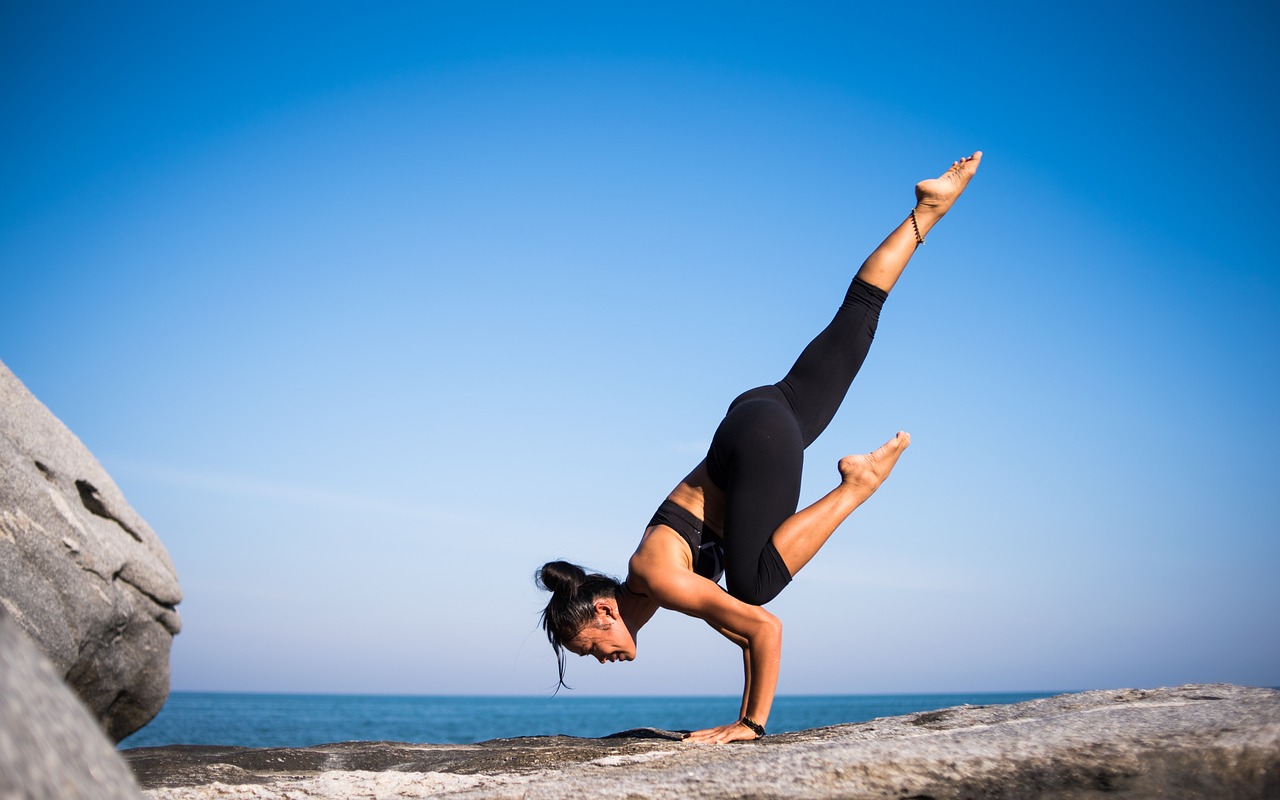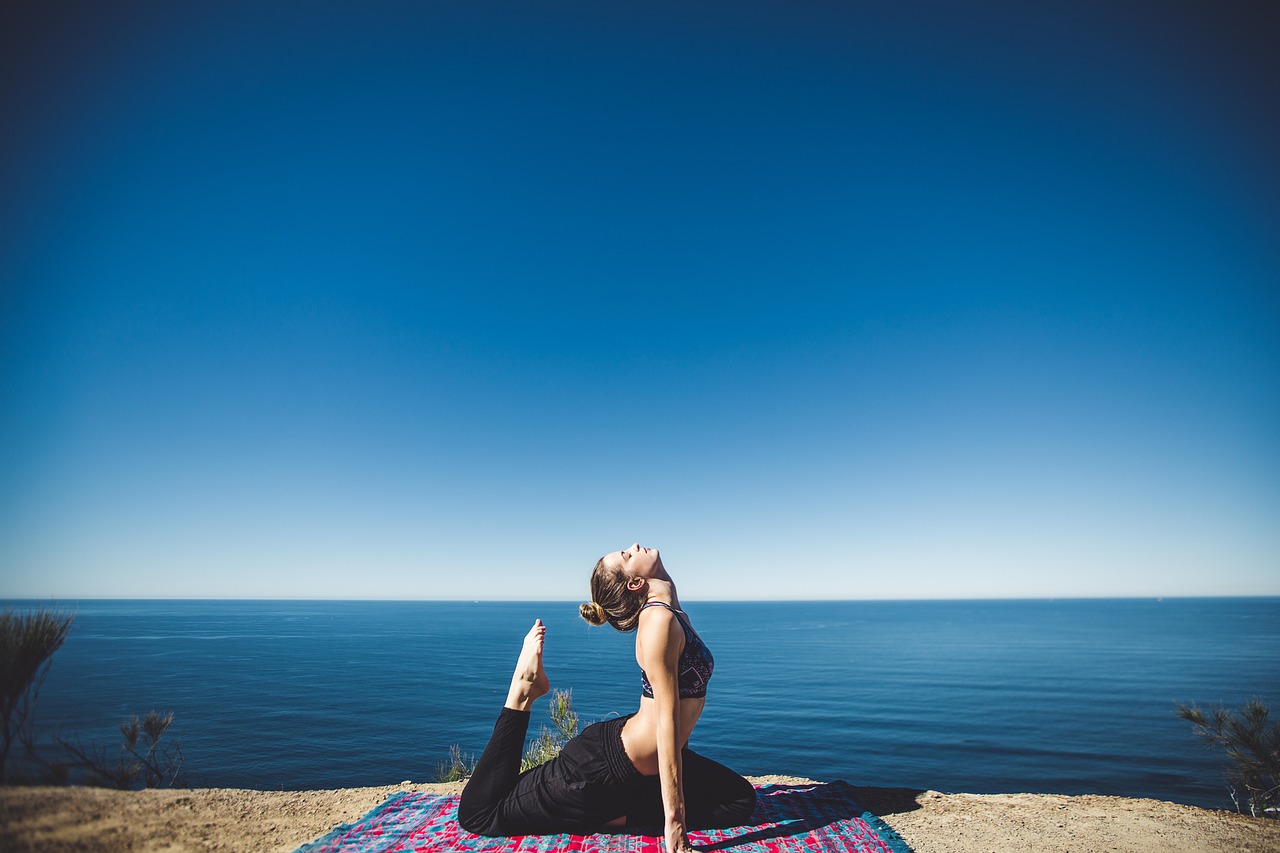Living with eczema can be a constant battle against itchy, irritated skin. If you’re tired of relying solely on creams and medications to find relief, then it may be time to explore an alternative approach: yoga. This ancient practice, known for its transformative effects on mind, body, and soul, holds the promise of soothing your skin from within. In this article, we will guide you on a journey through the world of yoga for eczema relief, exploring how this holistic practice can bring inner peace and healing to your skin. So, grab your yoga mat and get ready to embark on a path towards a calmer, more tranquil complexion.

Understanding Eczema
Eczema is a common skin condition that affects many people of all ages. It is a chronic inflammatory skin disorder characterized by red, itchy, and dry patches on the skin. These patches can vary in severity and can be a source of discomfort and frustration for those who suffer from the condition. Understanding what eczema is and what causes it is essential in finding effective ways to manage and alleviate its symptoms.
What is Eczema?
Eczema, also known as atopic dermatitis, is a chronic skin condition that causes the skin to become inflamed, itchy, and irritated. It can appear on different parts of the body, such as the face, hands, arms, and legs. Eczema often goes through periods of flare-ups and remission, making it a cyclical condition that requires long-term management.
Causes of Eczema
The exact cause of eczema is still unknown, but it is believed to be a combination of genetic and environmental factors. People with a family history of eczema or other allergic conditions, such as asthma or hay fever, are more likely to develop eczema. Environmental factors like allergens, irritants, and certain foods can trigger or worsen eczema symptoms.
Symptoms of Eczema
Eczema is characterized by various symptoms that can vary in intensity. Common symptoms of eczema include red or brownish-gray patches of skin, intense itching, dry and scaly skin, small raised bumps that may leak fluid when scratched, and thickened, cracked, or crusty skin. These symptoms can cause significant discomfort and affect a person’s quality of life.
The Impact of Stress on Eczema
Stress is a significant factor that can worsen eczema symptoms. While stress does not directly cause eczema, it can trigger flare-ups and make existing symptoms more severe. Understanding the connection between stress and eczema and finding effective ways to manage stress can help alleviate eczema symptoms and improve overall well-being.
Connection between Stress and Eczema
Stress can activate the body’s immune response and trigger inflammation, which can exacerbate eczema symptoms. Additionally, stress can lead to behaviors such as scratching or rubbing the affected areas, which can further irritate the skin and worsen the condition. People with eczema may also experience increased itching and a heightened sensitivity to certain triggers when under stress.
How Stress Worsens Eczema Symptoms
When we are stressed, our bodies release cortisol, a stress hormone that can suppress the immune system. This suppression can result in increased inflammation and a weakened skin barrier, making the skin more susceptible to irritants and allergens. Stress can also disrupt sleep patterns, which can negatively impact skin health and increase eczema symptoms.
Managing Stress for Eczema Relief
Finding effective ways to manage stress is crucial for individuals with eczema. One beneficial approach is incorporating relaxation techniques, such as yoga and meditation, into daily life. These practices can help reduce stress levels, promote relaxation, and improve overall well-being. By managing stress, individuals with eczema can potentially prevent flare-ups and minimize the severity of their symptoms.

The Role of Yoga in Eczema Relief
Yoga has gained popularity worldwide as a holistic practice that promotes physical, mental, and emotional well-being. Its therapeutic benefits extend to individuals with eczema, offering relief from symptoms and improving the overall quality of life. Understanding the benefits of yoga for eczema and the reasons behind its effectiveness can guide individuals in incorporating this practice into their eczema management routine.
Benefits of Yoga for Eczema
Yoga offers various benefits that are particularly helpful for individuals with eczema. It helps reduce stress levels, improve sleep quality, enhance circulation, and boost the immune system. Additionally, yoga encourages mindfulness and self-awareness, allowing individuals to better understand their body’s reactions and triggers, and make appropriate lifestyle changes to manage their eczema effectively.
Why Yoga Helps Soothe Eczema Symptoms
Yoga incorporates gentle stretching, breathing exercises, and relaxation techniques that can provide relief from eczema symptoms. The stretching poses in yoga help improve flexibility and circulation, promoting healthier skin. The breathing exercises can be calming and stress-reducing, decreasing the likelihood of stress-induced flare-ups. Lastly, the relaxation techniques used in yoga can induce a state of deep relaxation, which can alleviate itching and improve sleep patterns.
Yoga Poses for Eczema Relief
Certain yoga poses can be particularly beneficial for individuals with eczema. These poses focus on gentle stretching, deep breathing, and relaxation. Some poses worth trying include child’s pose, gentle forward folds, cat-cow pose, and legs-up-the-wall pose. It is essential to listen to your body and modify poses as needed to prevent any discomfort or aggravation of eczema symptoms.
Mindfulness and Meditation Techniques
In addition to yoga, mindfulness and meditation techniques can significantly contribute to eczema relief. These practices promote relaxation, reduce stress, and allow individuals to develop a positive mindset towards managing their eczema.
Mindfulness-Based Stress Reduction
Mindfulness-based stress reduction (MBSR) is a structured program that combines mindfulness meditation and yoga practices. It aims to cultivate awareness of the present moment and promote acceptance without judgment. MBSR has been shown to reduce stress and improve quality of life for individuals with various chronic conditions, including eczema.
Breathing Techniques for Eczema Relief
Deep breathing exercises can be a powerful tool for managing eczema symptoms. By consciously focusing on the breath, individuals can activate the body’s relaxation response, lower stress levels, and reduce itching sensations. Breathing techniques such as diaphragmatic breathing, alternate nostril breathing, and 4-7-8 breathing can be practiced regularly to promote relaxation and relieve eczema symptoms.
Guided Meditation for Eczema Relief
Guided meditation can be a valuable practice for individuals with eczema. It involves listening to a recorded or live meditation session led by an experienced practitioner. Guided meditation sessions often focus on body awareness, relaxation, and cultivating a calm and positive mindset. Regular participation in guided meditation can help individuals manage stress, reduce itching sensations, and improve overall well-being.

Dietary Considerations for Eczema Relief
Diet plays a significant role in managing eczema symptoms. Identifying triggers in your diet, incorporating anti-inflammatory foods, and considering an elimination diet are three important aspects to consider in achieving eczema relief through dietary changes.
Identifying Triggers in Your Diet
Certain foods can trigger or worsen eczema symptoms in some individuals. Common trigger foods include dairy products, gluten, nuts, soy, and shellfish. By keeping a food diary and tracking any changes in eczema symptoms, individuals can identify specific foods that may be causing flare-ups and avoid them to minimize symptoms.
Anti-Inflammatory Foods for Eczema Relief
Incorporating anti-inflammatory foods into your diet can help reduce eczema symptoms. Some examples of anti-inflammatory foods include fatty fish rich in omega-3 fatty acids, fruits and vegetables high in antioxidants, whole grains, nuts, and seeds. These foods can help reduce inflammation in the body and support healthy skin.
Elimination Diet and Eczema
An elimination diet involves removing potential trigger foods from your diet for a period of time, then reintroducing them one at a time to identify any adverse reactions. This process can help individuals pinpoint specific foods that may be exacerbating their eczema symptoms. It is recommended to do an elimination diet under the guidance of a healthcare professional or registered dietitian to ensure proper nutrition while eliminating potential trigger foods.
Using Essential Oils for Eczema Relief
Essential oils can be a natural and soothing addition to a comprehensive eczema treatment plan. Understanding the benefits of essential oils, knowing which oils are most effective for eczema relief, and the safe usage and application of essential oils are important considerations for individuals seeking alternative remedies for their eczema symptoms.
Benefits of Essential Oils in Eczema Treatment
Essential oils have been used for centuries for their therapeutic properties. Some essential oils possess anti-inflammatory, antimicrobial, and soothing properties that can benefit individuals with eczema. They can help reduce redness, inflammation, and itching, as well as promote healing and moisturization of the skin.
Top Essential Oils for Soothing Eczema Symptoms
Several essential oils have shown potential in soothing eczema symptoms. Lavender oil has calming and anti-inflammatory properties, while tea tree oil has antimicrobial and anti-itch properties. Chamomile oil and helichrysum oil are known for their soothing and healing effects on the skin. It is essential to dilute essential oils properly and perform a patch test before applying them to the skin to ensure safety and effectiveness.
Safe Usage and Application of Essential Oils
When using essential oils for eczema relief, it is crucial to prioritize safety. Essential oils should be properly diluted with carrier oils, such as coconut oil or almond oil, before application to the skin. They should also be patch-tested on a small area of skin to check for any adverse reactions. Individuals with eczema should consult with a healthcare practitioner or aromatherapist to determine the appropriate oils, dilution ratios, and application methods for their specific needs.
Creating a Relaxing Environment
Creating a relaxing environment is essential for individuals with eczema, as it can contribute to overall well-being and help alleviate symptoms. Choosing the right space for yoga, enhancing the environment for eczema relief, and creating a daily self-care routine are important aspects to consider when creating a soothing environment.
Choosing the Right Space for Yoga
When practicing yoga for eczema relief, it is important to choose a space that promotes relaxation and free movement. Find a quiet area free from distractions, ensure proper lighting, and make the space comfortable with the use of yoga mats, cushions, and props. Creating an inviting and peaceful environment can enhance the effectiveness of yoga practice in alleviating eczema symptoms.
Enhancing the Environment for Eczema Relief
In addition to yoga practice, individuals with eczema can make small adjustments to their environment to promote symptom relief. Using hypoallergenic bedding, maintaining proper humidity levels, and avoiding harsh chemicals and irritating fabrics can contribute to a healthier skin environment. Taking these steps can minimize exposure to potential triggers and help prevent flare-ups.
Creating a Daily Self-Care Routine
Establishing a daily self-care routine is crucial for individuals with eczema. This routine can include practices such as gentle skincare, moisturizing techniques, and implementing relaxation techniques like meditation or breathing exercises. By dedicating time to self-care every day, individuals with eczema can prioritize their well-being and effectively manage their symptoms.
Building a Yoga Practice for Eczema Relief
Building a yoga practice specifically for eczema relief involves starting with gentle yoga, progressing to more intensive practices, and incorporating yoga into daily life. By gradually building a yoga practice tailored to their needs, individuals with eczema can experience the full benefits of this ancient practice.
Starting with Gentle Yoga
For individuals with eczema, it is advisable to start with gentle yoga poses and gradually increase intensity as the body becomes more accustomed to the practice. Gentle poses such as seated forward folds, gentle twists, and supported backbends can provide benefits without placing excessive strain on the body. It is crucial to listen to the body, modify poses as needed, and not push beyond one’s physical limitations.
Progressing to More Intensive Practices
Once individuals with eczema have established a foundation with gentle yoga, they can gradually progress to more intensive practices. This can include more challenging poses, longer durations of practice, and the incorporation of dynamic movements. It is important to progress at a pace that feels comfortable and to always prioritize the body’s well-being and safety.
Incorporating Yoga into Daily Life
To maximize the benefits of yoga for eczema relief, it is beneficial to incorporate yoga into daily life beyond scheduled practice sessions. This can include incorporating mindful movements and stretches throughout the day, practicing breathing exercises during moments of stress, and cultivating a positive mindset by embodying yoga principles in everyday activities. By integrating yoga into daily life, individuals can experience consistent relief from eczema symptoms and overall improved well-being.
Additional Tips and Strategies
In addition to the main strategies discussed, there are several additional tips and strategies that individuals with eczema can incorporate into their daily routines to effectively manage their symptoms.
Moisturizing Techniques for Eczema-Prone Skin
Moisturizing the skin is essential for individuals with eczema, as it helps maintain the skin’s natural moisture barrier and prevent dryness and itching. Using a moisturizer specifically formulated for eczema-prone skin and applying it immediately after bathing can help lock in moisture and soothe the skin. It is important to choose fragrance-free and hypoallergenic products to minimize the risk of irritation.
Avoiding Triggers in Your Environment
Along with dietary triggers, environmental triggers can also exacerbate eczema symptoms. These can include exposure to harsh chemicals, allergens, excessive heat or cold, and certain fabrics. Identifying and avoiding these triggers as much as possible can help reduce flare-ups and prevent the worsening of eczema symptoms.
Seeking Professional Advice and Support
Consulting with a healthcare professional, such as a dermatologist or allergist, is important for individuals with eczema. They can provide personalized advice and treatment options based on the individual’s specific needs. Additionally, seeking support from online communities or support groups can help individuals connect with others who are experiencing similar challenges and share insights and strategies for managing eczema.
Overcoming Challenges and Staying Motivated
Managing eczema can present challenges and setbacks, but with determination and perseverance, individuals can overcome these obstacles and maintain the motivation needed to effectively manage their eczema symptoms.
Dealing with Flare-Ups and Setbacks
Flare-ups and setbacks are common in eczema management, and it is crucial to approach them with patience and resilience. During flare-ups, it is important to avoid scratching, apply moisturizers, and follow any prescribed treatments. It can be helpful to track triggers and symptoms to identify patterns and make necessary adjustments to the management plan.
Maintaining Consistency in Your Yoga Practice
Consistency is key when it comes to managing eczema symptoms with yoga. Regular practice helps maintain the benefits of yoga and allows individuals to better manage stress and inflammation. Setting a realistic schedule, prioritizing self-care, and finding ways to stay motivated can all contribute to maintaining consistency in the yoga practice.
Cultivating a Positive Mindset
Maintaining a positive mindset is crucial in managing eczema and its impact on overall well-being. By focusing on the progress made, acknowledging small victories, and practicing self-compassion, individuals can cultivate a positive mindset that supports their eczema management journey. It is important to remember that eczema does not define one’s worth or identity and that progress takes time.
In conclusion, managing eczema requires a comprehensive approach that addresses various aspects of physical and mental well-being. By understanding eczema, managing stress, incorporating yoga and mindfulness practices, considering dietary changes, utilizing essential oils, creating a calming environment, and building a consistent yoga practice, individuals can find relief from eczema symptoms and improve their overall quality of life. With patience, perseverance, and a holistic approach, eczema can be effectively managed, and individuals can cultivate a sense of well-being and confidence.
